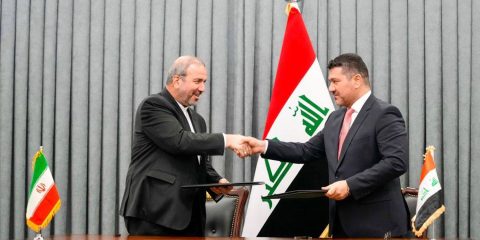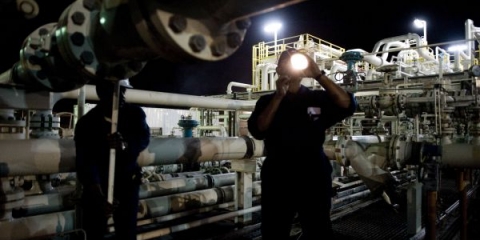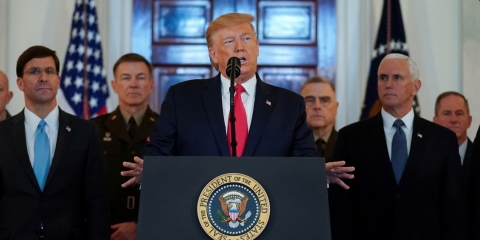Rivalries trump resettlement in liberated territory
The town of Sulaiman Bek epitomizes a major challenge facing Iraq: IS has been ousted, but ethno-sectarian politics are preventing displaced civilians from returning.
SULAIMANIYA - As the Iraqi government seeks to rebuild and resettle areas liberated from the self-proclaimed Islamic State (IS), Talib Muhammed would seem to be the prototype of an ideal ally.
He is a Sunni Arab leader with credibility in his community; he has effective working relationships with members of other ethnic and sectarian identity groups in the area; and he is a committed enemy of IS, having lost several members of his own family to the organization's progenitor, al-Qaida.
But more than 14 months after the liberation of Muhammed's city, Sulaiman Bek, it remains a ghost town populated only by militiamen. Its roughly 40,000 former residents have lost their homes and livelihoods. And Muhammed's efforts to stand up a local security force that would allow them to resettle have failed, despite his extensive outreach to Shia militia power brokers and Kurdish security authorities.
"I swear, I am tired," Muhammed said. He utters that Arabic phrase so often – wallah, taban – it has become something of a mantra.

Muhammed's story illustrates the enormous challenge posed by the prospect of resettling more than 1 million displaced citizens and healing ethno-sectarian divisions ripped open by the IS group. In dozens of towns recaptured from IS militants, various sectarian and ethnic identity groups do not share a vision for political cooperation in post-IS Iraq; as a result, they are trying to win long-standing arguments over demographics and territorial control by force, leaving thousands of homeless residents in limbo.
Before the invasion of IS militants, Sulaiman Bek was a Sunni-majority town in Iraq's so-called "disputed territories" – a heterogeneous belt of land stretching across Diyala, Kirkuk, Salahaddin and Ninewa provinces, which has suffered from a legacy of forced resettlement and ethnic cleansing dating back to the Saddam Hussein regime. Arabs, Kurds, and Turkomen have all laid competing claims to the land, which political leaders never managed to resolve through the legal procedures prescribed in Iraq's 2005 constitution.
Sulaiman Bek, which also had a minority Shia Turkomen population, is currently controlled mainly by the Badr Organization, a powerful Shia militia operating under the government's al-Hashid al-Shabi (Popular Mobilization) program. Hashid militias have been instrumental in retaking territory from IS fighters, but many elements, including Badr, appear to regard many Sunni civilians as IS collaborators without evidence or due process.
Now that Sulaiman Bek has been cleared – of both residents and IS occupiers – some Badr leaders don't seem to want a return to the old status quo. Instead, they see an opportunity to resolve territorial disputes in a way that would likely favor the Shia Turkomen population who, before the invasion of IS, lived as a demographic minority in Sulaiman Bek.
“It is too early to talk about Sunnis returning back to Sulaiman Bek," said a senior member of the Badr Organization in Tuz Khurmatu, of which Sulaiman Bek is a subdistrict. “If we are forced to bring them back, we will let few families to come back. And later they will leave because they won't find peace here.”
Muhammed, who has served as the Sulaiman Bek subdistrict director since 2004, has tried to work through the Hashid program, even meeting with Hadi al-Amiri, the leader of the Badr Organization and the senior official responsible for security in Diyala province, just to the east of Sulaiman Bek. In that meeting, Muhammed said, he expressed willingness to create a Sunni Hashid unit to protect Sulaiman Bek, which would ultimately report to Amiri.
"These are the men who will decide when the population of Sulaiman Bek gets to return," Muhammed said, referring to Amiri and Abu Mahdi al-Muhandis, the head of the Hashid program.
Muhammed said Amiri welcomed the idea of a Sunni Hashid unit to protect Sulaiman Bek, but there has been no progress toward setting it up. He said he has also met with Defense Minister Khalid al-Obeidi, Speaker of Parliament Salim al-Jabouri, and Muhammed Mahdi al-Bayati, the former Human Rights Minister and head of Badr in Tuz Khurmatu.
Many Iraqi security officials have expressed concerns about allowing Sunni civilians to return to liberated cities because some of them collaborated with – or at least tolerated the presence of – the IS organization and, before it, al-Qaida. Muhammed admits there is reason for suspicion.
"I understand why they are worried," he said. "I admit that our town was taken by these groups three times. Our town was a center for ISIS."
Muhammed sees a robust, Sunni-led local security force as an antidote to such problems. In the past, without a security presence that residents could trust, they had little ability to resist coercion by IS and its ilk – including al-Qaida and the Baathist Jaish Rijal al-Tariqa al-Naqshbandia (Naqshbandi Army), which was an early ally of IS with a presence in Sulaiman Bek and other areas.
While many Sunni Arabs might be reasonably suspected of IS sympathies, Muhammed himself has ample motivation to work against the group. He lost five brothers in bombings blamed on al-Qaida between 2003 and 2007; 15 of his guards have been killed over the years; and he has been targeted directly by several attacks, including four car bombs and two assaults on his home.
But Muhammed has not been able to form the intra-Iraqi alliances necessary to stand up a local security force or secure permission to return home – a failure that apparently stems from the rivalries among the various power centers jockeying for influence and territory in the aftermath of IS. Muhammed has tried to cultivate good relations with all of them, but given that many believe they are locked in a zero-sum competition, they seem to have little use for a man seeking a balance of interests.
In addition to his outreach to leaders in the Hashid program and the Iraqi government, Muhammed has appealed to the autonomous Kurdistan Regional Government (KRG) for help, offering to commit troops to create a new Peshmerga unit composed of Sulaiman Bek locals who would protect the town. Hassan Baram, the deputy head of the Patriotic Union of Kurdistan (PUK) party in Tuz, praised Muhammed as "the best official you can find in the area. We respect him – he has a balanced relationship with all the parties, including Kurds and Shia militias."
But Baram also voiced concern that Muhammed was seeking help from the KRG only out of desperation, and that he could just as easily side with Baghdad in the future.
Similarly, while Muhammed has a strong enough relationship with Shia Hashid militias to receive an audience with Amiri and Bayati, many Hashid leaders remain suspicious about his ultimate loyalty. His outreach to the Kurds is well known, and he also has kept a residence in the Kurdish city of Sulaimaniya since 2010, after it became clear he could not safely live full-time in Sulaiman Bek.
"Talib was never with the Shia Turkomen and always with the Kurds," a senior Badr officer said. "We cannot totally trust him."
Another complicating factor is the nearby town of Amerli, populated mainly by Shia Turkomen, who suffered for years from attacks by Sunni militants using Sulaiman Bek as a stronghold. Many Hashid militias in the area now have Shia Turkomen in their ranks, and some believe that allowing Sunnis to return to Sulaiman Bek just 7 kilometers away would put Amerli in renewed danger.
Without a security force in Sulaiman Bek capable of both repelling IS and protecting Sunni civilians, residents have scattered, with most finding temporary refuge in nearby Tuz. Control of the city is divided between Hashid militiamen and Kurdish security forces, who have engaged in deadly battles in an attempt to establish dominance.
In the midst of the chaos, many Sunni civilians have gone missing, with some "arrested" without a warrant by Hashid militiamen – including four of Muhammed's uncles. Those who have not been kidnapped try not to go outside, fearful of being branded as IS collaborators.
"They sit and await death," Muhammed said.
Ismael al-Hlub, the deputy governor of Salahaddin province, said that Muhammed has done "a good job for his town and is the best person for the job…. What is preventing the resettlement of Sulaiman Bek is the accumulation of sectarian issues in the area. It cannot be left only to Talib.”
Christine van den Toorn and Mohammed Hussein reported from Sulaimaniya. Ben Van Heuvelen contributed from the United States.






